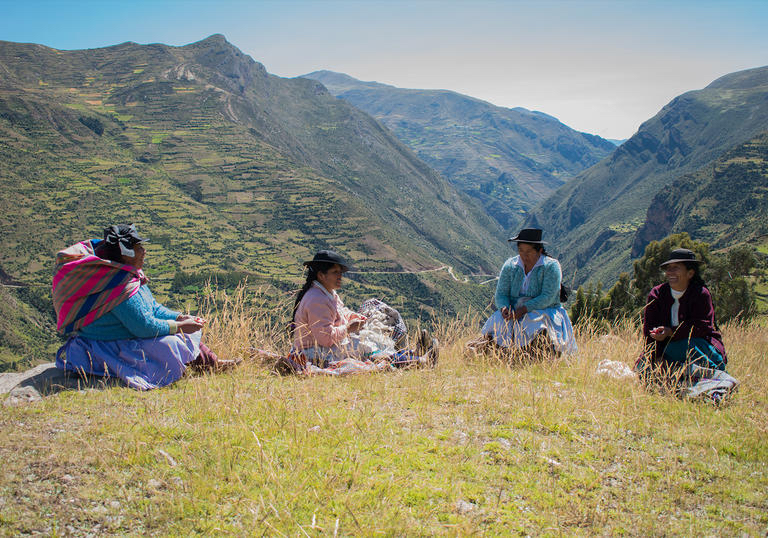Magda, Magna, Virginia and Santosa are survivors of the turbulent times that terrorism and military occupancy brought to the beautiful and peaceful village of Manta in the Peruvian Andes. Decades later, they narrate their stories, with a sense of serenity, maybe resignation in their voices .
Having been shunned and disowned by her family and neighbours, fortunately Magda can still rely on the support of her three childhood friends. As the women sit and peel potatoes together and wash their clothes in the water, they share their common experiences as victims of rape and the mothers of ‘hijos de soldados’ (soldiers’ children): seen by their environmentt as he diabolic children of the enemy. They also share their uplifting and light-hearted anecdotes of their childhoods before the civil conflict broke out- back when they led peaceful lives as shepherds in the mountains. Now, the town that they had long abandoned remains frozen in the past and fractured by the collective memory of violence.
The film also tells us about the trials against those responsible for the atrocoties. Seeing members of your family and community massacred by Sendero Luminoso, the maoist group that terrorised Peru in the 1980's, and then submitted to years of rape by soldiers in order to survive, how did the trials help these four women?
The trials can only be heard in the background, unimportant, like background music, without depriving us from the beauty of Manta and the Andes and everyday life. One by one the soldiers are questioned. There are many children, young adults now, who are the result of this mass rape. The trials never brought back dignity nor justice to the lives of the victims. Some of the victims got compensation, but for the women of those small villages in the Andes, life will be always dark. They are now accused and discriminated against by members of their communities, some too young to know the truth, of 'ripping off' the government by asking for compensation for all the years they enjoyed being 'lovers' of the soldiers, as mujeres de soldados

Behind the unimaginable trauma lies a message of hope which stems from the solidarity of the four women and the support that they receive from the former registrar of Manta: Don Ciro. Indeed, the elderly gentleman decides to go against the grain and speak in the trial, exposing the birth certificates of the ‘year of the soldiers’ children. To this end, Don Ciro unveils the systematic nature of the rape of indigenous women by the army officers who attempted to cover their tracks by giving their offspring false names. The snapshots of armed officers and the snippets of the recordings of the trial are seamlessly woven into the intimate dialogues between these women which form the backbone of the film.
The documentary’s organic structure framed around the intimate spaces of the home and the remote mountainous setting therefore grants the viewer direct access to these formerly silenced narratives. In sum, Patricia Wiesse Risso carries an empowering message forward of justice from below as the women find their voices to tell their own stories while questioning the enduring notion of unspeakable violence in Peru today.
After seeing this film, we can only hope that the hundreds of women represented by Magda, Magna, Virginia and Santosa, who shared the same past and unfortunately same present, will find peace.
Mujer de Soldado can be viewed tomorrow. Thursday 25th March here
Also join the Q&A https://hrworg.zoom.us/webinar/register/2416125378030/WN_j6pJPkoBTW-OCr…















